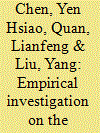|
|
|
Sort Order |
|
|
|
Items / Page
|
|
|
|
|
|
|
| Srl | Item |
| 1 |
ID:
127203


|
|
|
|
|
| Publication |
2014.
|
| Summary/Abstract |
The increases in a country's energy capacity are related to its gross domestic product (GDP). In Brazil, increases in income and the consumption of goods and services have led to an increase in the generation of solid waste (SW), which is sent to landfills as a method of treatment and final disposal. The purpose of this study was to facilitate an increase in energy generation from renewable resources, specifically from landfills via thermal biogas plants, and the research was divided into two phases. The first phase involved the assessment of the potential population size contributing to the landfill, which could result in the installation of a financially viable enterprise to generate electricity in Brazil. Next, an estimate of the costs associated with the generation and collection of solid waste in Brazil was predicted by GDP prognoses, the latter being in accordance with the National Energy Balance (Balanço Energético Nacional - BEN) plan created by the Mines and Energy Ministry of Brazil (Ministério de Minas e Energia do Brasil - MME). The net present value (NPV) and internal rate of return (IRR) of each enterprise scenario was used in the first stage to assess the plan's financial viability. In the second stage, estimation curves such as logistics, decreasing rate of growth, and logarithmic curves were used to establish relationships between the generation scenarios and the projected collection of SW and projected GDP. Thus, a range of possible landfill biogas/methane generation values and installed energy capacities were created, considering the extreme maximum and minimum values. These values were related to the energy sources from residual fuels reported by BEN. The results demonstrated that such values still represented a small percentage (0.00020% in 2010 and 0.44496-0.81042% in 2030) of the projected energy generation from residual fuels. Thus, an urgent need was identified to formulate policies that would encourage landfills as a source of renewable energy, broadening the number of financially viable initiatives for energy generation from landfill biogas for populations of fewer than 200,000 inhabitants.
|
|
|
|
|
|
|
|
|
|
|
|
|
|
|
|
| 2 |
ID:
124546


|
|
|
|
|
| Publication |
2013.
|
| Summary/Abstract |
This paper employs a structural time series model designed with three components of stochastic seasonality, trigonometric expression of cyclicality and local linear trend to investigate the evolutionary process of China's GDP. In particular, the model is able to detect the stop-go feature of China's economic growth, i.e., growth cycle, as well as business cycle. The empirical result suggests that most variation in China's macroeconomic performance came from business cycle. The investigation of the three components along with historical events suggests that the Chinese economy had been largely influenced by political activities up to the early 1990s. In the mid-1990s China entered a period of stable and highly growing economy, thanks to the economic reform and the successful implementation of macroeconomic policies. However, since the mid-2000s China has become more sensitive to the turbulences in international markets. In the foreseeable future, the challenge facing China is a more volatile economy with possible slowdown in the economic growth, although the growth rate would still be high compared to developed economies.
|
|
|
|
|
|
|
|
|
|
|
|
|
|
|
|
|
|
|
|
|